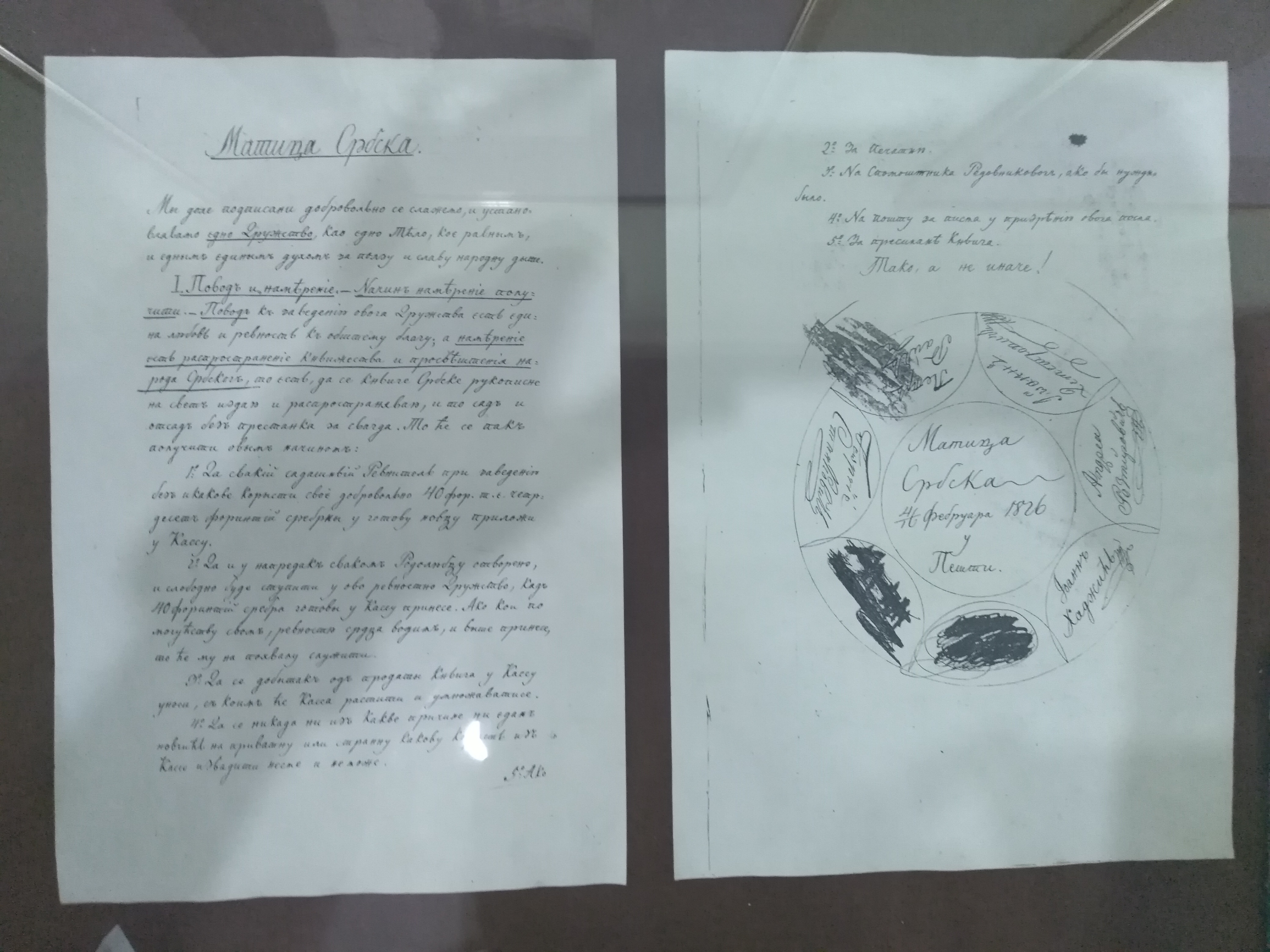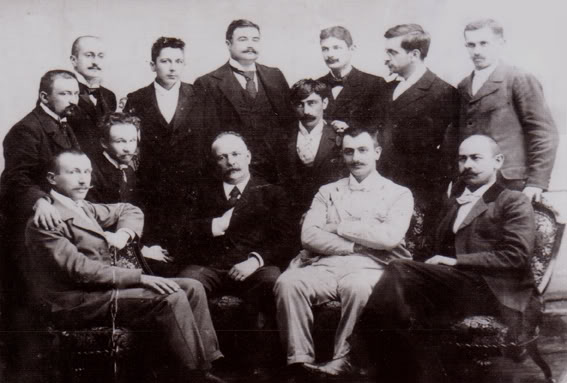|
Association Of Writers Of Serbia
The Association of Writers of Serbia (Serbian language, Serbian: Удружење књижевника Србије, ''Udruženje književnika Srbije'') is Serbia's official writing association. Its current president is Miloš Janković. History The association was founded on 26 May 1905. Its founders and first members were Aleksandar Belić, Borivoje Popović, Dobrosav Ružić, Dragomir Janković, Dragoljub Pavlović, Dragutin Ilić, Živojin Dačić, Jovan Skerlić, Lujo Vojnović, Ljubomir Jovanović, Milan Milićević, Milovan Glišić, Milorad Mitrović (poet), Milorad Mitrović, Milorad Pavlović-Krpa, Nikola Vulić, Pavle Popović, Petar Odavić, Radoje Domanović, Rista Odavić, Simo Matavulj (as president) and Stanoje Stanojević.Milovan Bogavac, Association of Serbian Writers 1905-1945, UKS history Post-WWII Association was re-established after the liberation of Belgrade on the meeting which took place on 31 December 1944. Notable signatories to the initiative included Is ... [...More Info...] [...Related Items...] OR: [Wikipedia] [Google] [Baidu] |
Serbia
, image_flag = Flag of Serbia.svg , national_motto = , image_coat = Coat of arms of Serbia.svg , national_anthem = () , image_map = , map_caption = Location of Serbia (green) and the claimed but uncontrolled territory of Kosovo (light green) in Europe (dark grey) , image_map2 = , capital = Belgrade , coordinates = , largest_city = capital , official_languages = Serbian language, Serbian , ethnic_groups = , ethnic_groups_year = 2022 , religion = , religion_year = 2022 , demonym = Serbs, Serbian , government_type = Unitary parliamentary republic , leader_title1 = President of Serbia, President , leader_name1 = Aleksandar Vučić , leader_title2 = Prime Minister of Serbia, Prime Minister , leader_name2 = Đuro Macut , leader_title3 = Pres ... [...More Info...] [...Related Items...] OR: [Wikipedia] [Google] [Baidu] |
Nikola Vulić
Nikola Vulić ( sr-cyr, Никола Вулић); (Shkodër, Ottoman Empire, 27 November 1872 – Belgrade, Yugoslavia, 25 May 1945) was a Serbian historian, classical philologist, prominent archaeologist, doctor of philosophy and professor at the University of Belgrade. Biography Born in Shkodër (modern Albania) in 1872 during the period of Ottoman rule, he left for Serbia where he studied Latin, Old Church Slavonic, Ancient Greek, and ancient history. He graduated from the University of Belgrade in history. For his post-graduate studies he went to the University of Munich, where he received his doctorate. Upon his return to Belgrade, he was named professor at his ''alma mater''. During World War I, Serbia's Minister of Education in-exile in Greece concluded that professors and teachers should be seconded from the army. Nikola Vulić was exempt from further serving in the army in 1917. In Clermont-Ferrand he taught Latin to both Serb and French students. He is remembered as th ... [...More Info...] [...Related Items...] OR: [Wikipedia] [Google] [Baidu] |
Ivo Andrić
Ivo Andrić ( sr-Cyrl, Иво Андрић, ; born Ivan Andrić; 9 October 1892 – 13 March 1975) was a Yugoslav novelist, poet and short story writer who won the Nobel Prize in Literature in 1961 Nobel Prize in Literature, 1961. His writings dealt mainly with life in his native Bosnia (region), Bosnia under Ottoman Bosnia and Herzegovina, Ottoman rule. Born in Travnik in Austria-Hungary, modern-day Bosnia and Herzegovina, Andrić attended high school in Sarajevo, where he became an active member of several South Slavs, South Slav national youth organizations. Following the assassination of Archduke Franz Ferdinand in June 1914, Andrić was arrested and imprisoned by the Austro-Hungarian police, who suspected his involvement in the plot. As the authorities were unable to build a strong case against him, he spent much of the war under house arrest, only being released following a general amnesty for such cases in July 1917. After the war, he studied South Slavic history and ... [...More Info...] [...Related Items...] OR: [Wikipedia] [Google] [Baidu] |
Isidora Sekulić
Isidora Sekulić ( sr-cyr, Исидора Секулић, 16 February 1877 – 5 April 1958) was a Serbian writer, novelist, essayist, polyglot and art critic. She was "the first woman academic in the history of Serbia" after she joined the Serbian Academy of Sciences and Arts in 1950. Biography Sekulić was born in Mošorin, a village of Bács-Bodrog County, (now Serbia). Apart from her studies in literature, Sekulić was also well versed in natural sciences as well as philosophy. She graduated from the pedagogical school in Budapest in 1892, and obtained her doctorate in 1922 in Germany. Her travels included extended stays in England, France and Norway. Her travels from Oslo through Bergen to Finnmark resulted in ''Pisma iz Norveške / Letters from Norway'' meditative travelogue in 1914. Her collection of short stories, ''Saputnici,'' are unusually detailed and penetrating accomplishment in self-analysis and a brave stylistic experiment. She also spoke several classical as w ... [...More Info...] [...Related Items...] OR: [Wikipedia] [Google] [Baidu] |
Socialist Republic Of Serbia
The Socialist Republic of Serbia ( sh-Cyrl-Latn, separator=" / ", Социјалистичка Република Србија, Socijalistička Republika Srbija), previously known as the People's Republic of Serbia ( sh-Cyrl-Latn, separator=" / ", Народна Република Србија, Narodna Republika Srbija, National Republic of Serbia), commonly abbreviated as Republic of Serbia, SR Serbia or simply Serbia, was one of the six Constituent republics of the Socialist Federal Republic of Yugoslavia, constituent republics of the Socialist Federal Republic of Yugoslavia in what is now the modern day states of Serbia and the disputed territory of Kosovo. Its formation was initiated in 1941, and achieved in 1944–1946, when it was established as a federated republic within Yugoslavia. In that form, it lasted until the constitutional reforms from 1990 to 1992, when it was reconstituted, as the Republic of Serbia (1992–2006), Republic of Serbia within the Federal Republic of ... [...More Info...] [...Related Items...] OR: [Wikipedia] [Google] [Baidu] |
Socialist Autonomous Province Of Vojvodina
The Socialist Autonomous Province of Vojvodina was one of two autonomous provinces within the Socialist Republic of Serbia, in the former Socialist Federal Republic of Yugoslavia. The province is the direct predecessor to the modern-day Serbian Autonomous Province of Vojvodina. The province was formally created in 1945 in the aftermath of the World War II in Yugoslavia, as the Autonomous Province of Vojvodina. In 1968, it was granted a higher level of political autonomy, and the adjective ''Socialist'' was added to its official name. In 1990, after the constitutional reform influenced by what is known as the anti-bureaucratic revolution, its autonomy was reduced to the pre-1968 level, and the term ''Socialist'' was dropped from its name. It was encompassing regions of Srem, Banat and Bačka, with capital in Novi Sad. Throughout its existence Serbs in Vojvodina constituted the largest ethnic group in the province with a parallel strong affirmation of multi-ethnic and multi-cu ... [...More Info...] [...Related Items...] OR: [Wikipedia] [Google] [Baidu] |
Novi Sad
Novi Sad ( sr-Cyrl, Нови Сад, ; #Name, see below for other names) is the List of cities in Serbia, second largest city in Serbia and the capital of the autonomous province of Vojvodina. It is located in the southern portion of the Pannonian Plain on the border of the Bačka and Syrmia geographical regions. Lying on the banks of the Danube river, the city faces the northern slopes of Fruška Gora and it is the fifth largest of all List of cities and towns on the river Danube, cities on the river Danube. It is the largest Danube city that is not the capital of an independent state. , the population of the city proper area totals 260,438 while its urban area (including the adjacent settlements of Petrovaradin and Sremska Kamenica) comprises 306,702 inhabitants. According to the city's Informatika Agency, Novi Sad had 415,712 residents in 2025. Novi Sad was founded in 1694, when Serb merchants formed a colony across the Danube from the Petrovaradin Fortress, a strategic Habsb ... [...More Info...] [...Related Items...] OR: [Wikipedia] [Google] [Baidu] |
Matica Srpska
The Matica srpska ( sr-Cyrl-Latn, Матица српска, Matica srpska, ) is the oldest Serbian language independent, non-profit, non-governmental and cultural-scientific Serbian national institution. It was founded on June 1, 1826, in Pest, Hungary, Pest (today a part of Budapest) by the Serbs, Serbian Holy Roman Empire, habsburg legislator Jovan Hadžić and other prominent members of the Serbian Revolution and Serbian Revival, National Revival. The Matica was moved to Novi Sad in 1864. It is the oldest matica in the world. The main goals are to restore and promote Serbian national and cultural identity in the fields of art, science, spiritual creativity, economy and public life as well as to care for social development of Serbia. The literary and cultural society played a huge role in the flourishing of science and culture of the Serbs of Vojvodina, Serbia. The need for national homogenization, enlightenment, as well as the publication of Serbian books, were the main reaso ... [...More Info...] [...Related Items...] OR: [Wikipedia] [Google] [Baidu] |
Stanoje Stanojević
Stanoje Stanojević ( sr-Cyrl, Станоје Станојевић; 13 August 1874 – 30 July 1937) was a Serbian historian, university professor, academic and a leader of many scientific and publishing enterprises. Career Stanojević finished university studies in Belgrade's Grandes écoles and post-graduate studies in philosophy in Vienna, where he received his PhD in 1896. He was a student of Konstantin Jireček and Vatroslav Jagić. Stanojević belongs to the first generation of Serbian historians educated abroad, at European universities. From 1898 to 1899 he was professor at the Serbian high school in Istanbul and also worked at the Russian Archaeological Institute there, where he laid the foundations for his two-volume work ''Vizantija i Srbi'' (''Byzantium and the Serbs''), published from 1903 to 1906. In 1900, he lectured and years later became a professor of the Grande école (University of Belgrade), his ''alma mater''. During Austro-Hungarian occupation of Serb ... [...More Info...] [...Related Items...] OR: [Wikipedia] [Google] [Baidu] |
Simo Matavulj
Simo Matavulj (; 12 September 1852 – 20 February 1908) was a Serbian writer and translator. Biography After finishing elementary school in his hometown of Šibenik, he continued his education in Krupa Monastery and Zadar. He started working as a teacher in Montenegro in 1881 and moved to Serbia in 1887. He was a representative of lyric realism, especially in short prose. As a writer, he is best known for employing his skill in holding up to ridicule the peculiar foibles of the Dalmatian folk. Matavulj was an honorary member of the Matica srpska of Novi Sad, the first president of the Association of Writers of Serbia, president of the Society of Artists of Serbia and a member of the Serbian Royal Academy. Legacy Nobel prize winner Ivo Andrić called him "the master storyteller". Works *''Noć uoči Ivanje'', Zadar, 1873. *''Naši prosjaci'', Zadar, 1881. *''Iz Crne Gore i Primorja I'', Novi Sad, 1888. *''Iz Crne Gore i Primorja II'', Cetinje, 1889. *''Novo oružje'', B ... [...More Info...] [...Related Items...] OR: [Wikipedia] [Google] [Baidu] |
Rista Odavić
Riste (), also spelled Rista, is a Kashmiri meatball dish, made from mutton, beef, and rarely from chicken. It is an important part of Kashmiri Wazwan. Meat is grounded before being combined with spices and eggs. Then meat is rolled by hand into balls, which are cooked in hot water for half an hour. Then balls are then boiled in a gravy to flavour the dish. See also * Gushtaba – A traditional Kashmiri dish made with minced meat and yogurt. * Rogan Josh – A fragrant and spicy meat curry from Kashmir. * Wazwan – The traditional multi-course Kashmiri feast. * Kashmiri cuisine – The culinary traditions of Kashmir. * List of meatball dishes A meatball is ground or minced meat rolled into a small ball, sometimes along with other ingredients, such as bread crumbs, minced onion, eggs, butter, and seasoning. Meatballs are cooked by frying, baking, steaming, or braising in sauce. There ... – A list of meatball dishes from around the world. Kashmiri cuisine Mughlai cuis ... [...More Info...] [...Related Items...] OR: [Wikipedia] [Google] [Baidu] |




